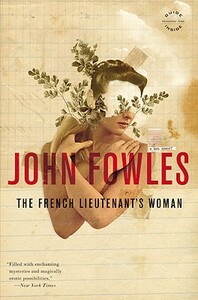Take a photo of a barcode or cover
I read this book too long ago to tell you more than that I was fascinated by Fowles' recognition of the enormous gap in consciousness between himself and his readers, on one side, and the people of over a century earlier who are his characters. At one point he interrupts his narrative to tell us about the impossibility of really understanding the thinking of those times, while assembling enough clues to give us a sense of their anxieties and aspirations. In the film version (on which Fowles collaborated) that distance is made clear by the device of showing us both the fictional characters and the 20th century filmmakers. I loved it.
dark
emotional
reflective
medium-paced
Plot or Character Driven:
Character
Strong character development:
No
Loveable characters:
No
Diverse cast of characters:
No
Flaws of characters a main focus:
Yes
This book was a suprise in how much I enjoyed it. I loved the language. I loved the perspective of the narrator. I loved the "storybook" quality of it.
I wish I had the time to read John Fowle's other books, but they are simply too long for me right now.
I wish I had the time to read John Fowle's other books, but they are simply too long for me right now.
Двоякое впечатление.
С одной стороны, в чтение я втянулась далеко не сразу. С другой стороны, когда втянулась, буквально не могла остановиться.
Автор бережно обращается с персонажами и любуется природой. Персонаж страдает, но не теряет достоинства, как бы это не воспринималось внешним миром.
Некоторые цитаты так и хочется записать.
Опять же знаменитая двойная концовка, из-за которой нам в свое время преподаватель советовала её прочитать.
Викторианский роман не мой любимый жанр, тем не менее, некоторое удовольствие я получила.
С одной стороны, в чтение я втянулась далеко не сразу. С другой стороны, когда втянулась, буквально не могла остановиться.
Автор бережно обращается с персонажами и любуется природой. Персонаж страдает, но не теряет достоинства, как бы это не воспринималось внешним миром.
Некоторые цитаты так и хочется записать.
Опять же знаменитая двойная концовка, из-за которой нам в свое время преподаватель советовала её прочитать.
Викторианский роман не мой любимый жанр, тем не менее, некоторое удовольствие я получила.
Would have been one star, except I ended up caring for the characters, which was a surprise to me given my general dislike for the narrator. I think postmodernism is fascinating, and the author's project was very interesting to me. Some of the narrator's asides to the reader make for some interesting reading, too. But the whole spirit of it pisses me right off - the narrator telling me that if I think Charles is a bastard, I'm judging him too harshly, because I don't understand point x and point y about him - DON'T TELL ME WHAT TO THINK. Don't point out the sexism of Victorian society ("ah, nice one, narrator") and then use sexist language in your writing anyway ("oh, but the narrator said it, I guess it's ok"). Don't tell me that Charles isn't the protagonist, it's actually Sarah, because I don't have to believe you.
The huge irony is that by trying to write a novel which mocks the god-like role of the Victorian narrator, Fowles continuously draws our attention (intentionally at times, but in my case I think it was mostly unintentional) to how god-like his 20th century narrator is. This is how novels work, he says, look how shallow and artificial everything is - now enjoy this story. For me, it only worked if I either blotted out the tyrannical narrator and engaged with the characters, or if I went along with the cynical voice during those sections where he speaks directly to the reader.
Sometimes the double aim synthesised in a pleasurable way - I enjoyed the ironic narrator attacking the old-fashioned Victorian novel in tandem with faux old-fashioned Victorian novel - but mostly it was annoying and narcissistic. Worst of all is the way he asks us to challenge traditional frameworks, and then puts forwards his narrator opinions as though they were unchallengeable facts. I think I would have liked this more if I was younger, perhaps... But alas, it didn't do it for me. Best bits were the descriptions of Lyme Regis, one of my favourite places in the world. Personally, that made it all worth it, to be honest.
The huge irony is that by trying to write a novel which mocks the god-like role of the Victorian narrator, Fowles continuously draws our attention (intentionally at times, but in my case I think it was mostly unintentional) to how god-like his 20th century narrator is. This is how novels work, he says, look how shallow and artificial everything is - now enjoy this story. For me, it only worked if I either blotted out the tyrannical narrator and engaged with the characters, or if I went along with the cynical voice during those sections where he speaks directly to the reader.
Sometimes the double aim synthesised in a pleasurable way - I enjoyed the ironic narrator attacking the old-fashioned Victorian novel in tandem with faux old-fashioned Victorian novel - but mostly it was annoying and narcissistic. Worst of all is the way he asks us to challenge traditional frameworks, and then puts forwards his narrator opinions as though they were unchallengeable facts. I think I would have liked this more if I was younger, perhaps... But alas, it didn't do it for me. Best bits were the descriptions of Lyme Regis, one of my favourite places in the world. Personally, that made it all worth it, to be honest.
challenging
dark
medium-paced
Plot or Character Driven:
A mix
Strong character development:
Yes
Loveable characters:
Yes
Diverse cast of characters:
No
Flaws of characters a main focus:
Yes
Qué experiencia, qué maravilla.
Me lo he pasado en grande leyéndola. Al principio pensaba que me iba a enfrentar a una novela romántica victoriana y me han dado esto y mucho más.
Para empezar, en el aspecto de la trama, lo he vivido al máximo. Ha sido como un slow burn de 400 y pico páginas que me ha tenido a cada rato soltando gaps y comentarios de pura sorpresa. Vamos, sí que he vivido la historia de Charles y Sara. Y estos dos personajes me llevan a destacar lo interesantes que son, en especial por su construcción psicológica y lo "libres" que son, porque John Fowles ha construido una maravilla de obra cuyos hilos no tienen control esencial. Y aquí viene otro punto de la novela que me ha chiflado a puntos exagerados.
La narración. Wow. Simplemente qué maravilla y qué juego más divertido en el que te mete Fowles con su vacile y sus datos sobre la época, con esas notas a pie de página que te dan más contexto y que, al menos a mí, no me ha dificultado ni ha hecho especialmente densa la lectura. No. Me ha ayudado a darle más color a una historia muy bien estudiada y estructurada pero curiosamente libre y espontánea.. Me quito el sombrero ante John Fowles.
Me lo he pasado en grande leyéndola. Al principio pensaba que me iba a enfrentar a una novela romántica victoriana y me han dado esto y mucho más.
Para empezar, en el aspecto de la trama, lo he vivido al máximo. Ha sido como un slow burn de 400 y pico páginas que me ha tenido a cada rato soltando gaps y comentarios de pura sorpresa. Vamos, sí que he vivido la historia de Charles y Sara. Y estos dos personajes me llevan a destacar lo interesantes que son, en especial por su construcción psicológica y lo "libres" que son, porque John Fowles ha construido una maravilla de obra cuyos hilos no tienen control esencial. Y aquí viene otro punto de la novela que me ha chiflado a puntos exagerados.
La narración. Wow. Simplemente qué maravilla y qué juego más divertido en el que te mete Fowles con su vacile y sus datos sobre la época, con esas notas a pie de página que te dan más contexto y que, al menos a mí, no me ha dificultado ni ha hecho especialmente densa la lectura. No. Me ha ayudado a darle más color a una historia muy bien estudiada y estructurada pero curiosamente libre y espontánea.
Spoiler
El que llegara a meterse en la propia obra, sentado junto a Charles en el tren o al final, cuando retrasa su reloj y nos invita a leer tres finales distintos...
challenging
mysterious
reflective
medium-paced
Plot or Character Driven:
Character
Strong character development:
Complicated
Loveable characters:
No
Diverse cast of characters:
No
Flaws of characters a main focus:
Complicated
Both purposefully Victorian and post-modern, with some of the most carefully selected prose I've read in some time. Fowles mimicked the style of a dusty romance from the end of the 19th century, but peppers it with his own opinions and observations of the time, comparing the 1860s to the 1960s he was writing from. He even inserts himself as a character in the last chapters of the book.
I really enjoyed the self-awareness of the book, the way that it admits the story is a fiction, is created by the author. Yet Fowles often suggests that the characters are not under his power, that he does not know what some of them are thinking or doing. He doesn't even have a decided ending, but instead presents two suggesting either is plausible and likely.
While the metafictional parts delighted me, the story itself—of a wishy-washy amateur paleontologist and his encounters with the woman of the title—sometimes bored me. The eponymous French Lieutenant's woman is mysterious with a rumored dark past, but Fowles doesn't let that propel the story, and instead lets his fossil-hunter (who is most interested in sand dollars, of all things) flop around, feel lost, be rude to his servant, be bored by his fiancee, and worry about money. In short, the main character is dull and relatively unlikeable. It was a pity such a bore and boor polluted what could have been a fantastic book.
I really enjoyed the self-awareness of the book, the way that it admits the story is a fiction, is created by the author. Yet Fowles often suggests that the characters are not under his power, that he does not know what some of them are thinking or doing. He doesn't even have a decided ending, but instead presents two suggesting either is plausible and likely.
While the metafictional parts delighted me, the story itself—of a wishy-washy amateur paleontologist and his encounters with the woman of the title—sometimes bored me. The eponymous French Lieutenant's woman is mysterious with a rumored dark past, but Fowles doesn't let that propel the story, and instead lets his fossil-hunter (who is most interested in sand dollars, of all things) flop around, feel lost, be rude to his servant, be bored by his fiancee, and worry about money. In short, the main character is dull and relatively unlikeable. It was a pity such a bore and boor polluted what could have been a fantastic book.
This book spent hundreds of pages lulling me into a false sense of three-star-ness, only to dramatically reveal another two stars around the beginning of the third act.


